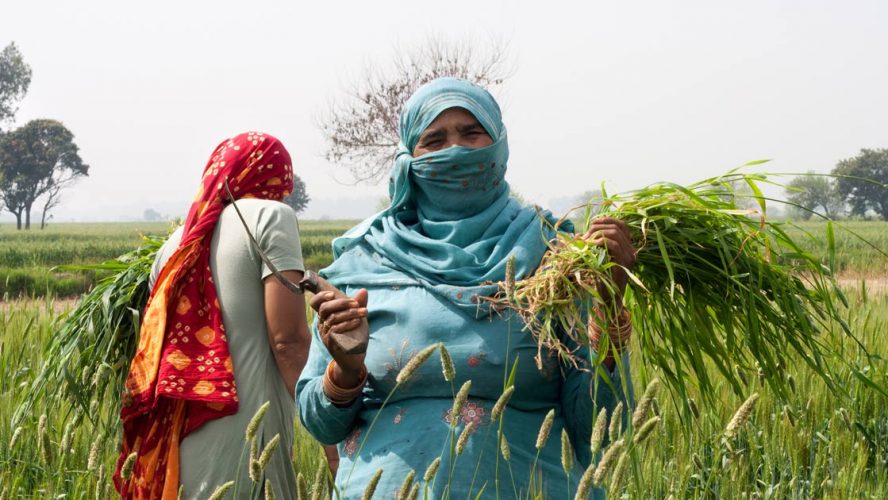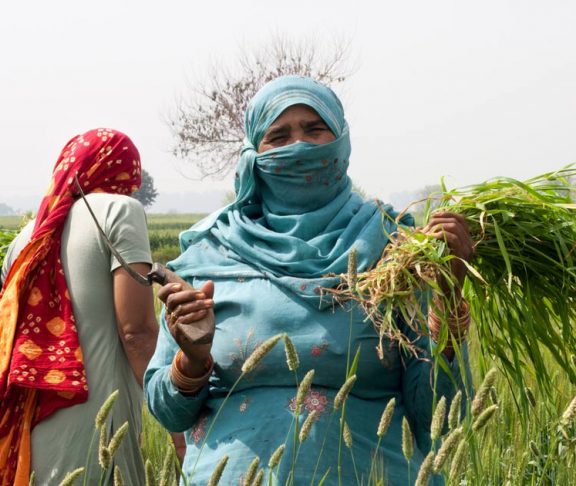Collaborative action is needed by companies, consumers and governments if smallholder families are to earn a living income from the produce they grow on their farms.
Every working smallholder farmer in every corner of the world deserves to earn a living income. This is an income that does more than simply lift growers and their families above the poverty line. Instead, it should ensure that everyone in their household can enjoy a decent standard of living.
That’s the dream anyway. The reality is that a shocking 63% of people working in agriculture live in extreme poverty. In fact, according to figures from the World Bank, there are an estimated 500 million smallholder farming households globally, who comprise a large proportion of the world’s poor living on less than $2 a day. This situation has to end insists Dr Gerd Müller, the German Federal Minister for Economic Cooperation and Development — and governments around the world can help by offering their support in a number of areas.
“Farmers in developing countries must be able to make a living from their work,” says Müller. “We support them by jointly developing better farming methods and additional sources of income. We also help build the capacity of local authorities so that they can support farmers in their work.”
Buying fairly, not cheaply
But Dr Müller also stresses that this problem is so big and so devastating that governments can’t possibly tackle it alone. German and European consumers also have to get involved and have a responsibility to buy fairly — not just cheaply. “Buying sustainable, fairly traded products benefits farmers directly,” he says. “Through our purchasing choices, we can put pressure on retailers and industry to get them to respect human rights and pay fair prices in global supply chains.”
To solve poverty issues, everyone needs to play their part.
Government support and consumer power are indispensable to end the economic plight facing many smallholder farmers. But moreover, companies need to do their bit, too. By joining forces they can create consistent sustainability messages while using their influence and resources more effectively.
Because, ultimately, this is a systemic problem so collaboration between all actors is critical. “To solve poverty issues, everyone needs to play their part,” says Antonie Fountain, Managing Director of The Voice Network, an association of NGOs and Trade Unions working on sustainability in the field of cocoa production. “That means businesses, governments, civil society, academia, farmers, etc, getting together to identify objectives and share learnings. We’re starting to see results, slowly: there’s now a broad industry ambition to end deforestation in major cocoa-producing countries, for instance.”
Bringing different stakeholders together
What’s more, GIZ — the German development cooperation commissioned by the German Federal Ministry for Economic Cooperation and Development (BMZ) is facilitating ‘The Living Income Community of Practice’, which brings together different stakeholders to work towards a living income for smallholder farming families. “With our work, we have been able to show that there is a large gap between what cocoa farmers should earn and what they are actually earning today,” says Christoph Beier, Vice-Chair of the Management Board at GIZ. “This should be a wake-up call to companies and governments to take remedial action.”
A living income isn’t ‘a nice to have’. It should be a human right, and work is happening to help all smallholder farmers achieve it.
Dr Beier notes that smallholder farmers producing for global supply chains often receive just a fraction of the consumer price, so living incomes have to be an integral part of sustainable supply chains. The trouble is, says Antonie Fountain, some companies don’t know enough about their suppliers and who they source their products from. Yet they have a moral duty to find out.
Businesses should understand their supply chains
“I find it incredible that, in the 21st century, products are still being grown or made off the back of exploitation and extreme poverty,” notes Fountain. “The second UN Guiding Principle on Business and Human Rights states that companies have a responsibility to respect human rights. But how can a company do that if it doesn’t understand every part of its supply chain? Businesses must have reliable and credible auditing systems in place to make sure they are sourcing sustainably and ethically. Otherwise they’re effectively saying: ‘We don’t care what happens in our supply chains.’”
Sarah Roberts is Executive Director of The Ethical Tea Partnership, a not for profit organisation bringing together tea companies with development agencies, NGOs, and governments to create a fairer, more sustainable tea industry. She believes that deeper collaboration between companies, governments and NGO’s and a focus on longer term social impact work is the key to improving lives in tea communities.
Roberts says: “By working together we can amplify and accelerate our impact. A good example of this is our work with our partners on Malawi Tea 2020. Together with the Tea Association of Malawi (TAML), Oxfam, IDH (the Sustainable Trade Initiative), and GIZ (German Development Agency), we’re leading a coalition of stakeholders from across the entire tea value chain with the aim of creating a more competitive Malawian tea industry where workers earn a living wage and smallholders are thriving.”
“It is clear that in addition to collaborative working, companies also need to know the realities that farmers and workers are facing – they should look at what they can do with regard to their own terms of trade and procurement practices,” Roberts adds.
Giving farmers skills and vocational training
Another way to help smallholder farmers is by helping them diversify into other areas if they aren’t able to earn a living income from agriculture alone. “Take Malawi, where a number of factors impact on tea farmers’ incomes,” says Roberts. “A significant one is that many people struggle to produce a living income when they only have small plots of land. So it is essential that governments are investing in skills training and vocational development for those who will not be able to earn enough income from their plots.”
A living income isn’t ‘a nice to have’. It should be a human right, and work is happening to help all smallholder farmers achieve it. But it’s a massive undertaking and more needs to be done. Joined up thinking and collaborative action from everyone is the only way forward.

Dr Gerd Müller
German Federal Minister for Economic Cooperation and Development

Antonie Fountain
Managing Director, The VOICE Network

Dr Christoph Beier
Vice-Chair of the Management Board GIZ

Sarah Roberts
Executive Director, Ethical Tea Partnership

